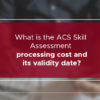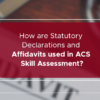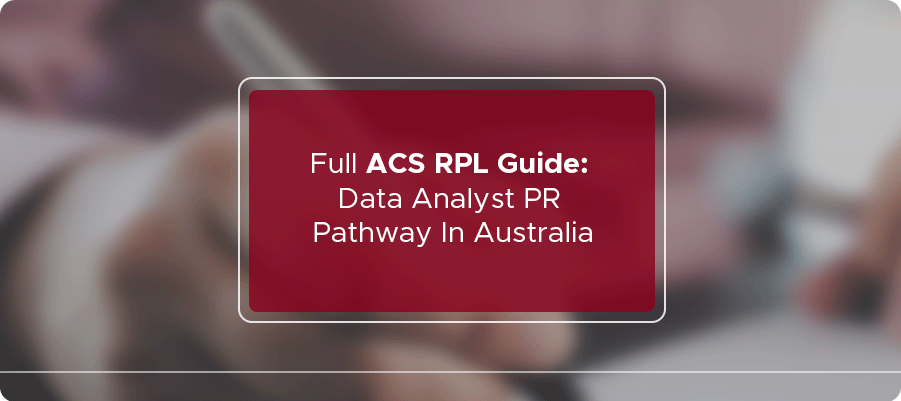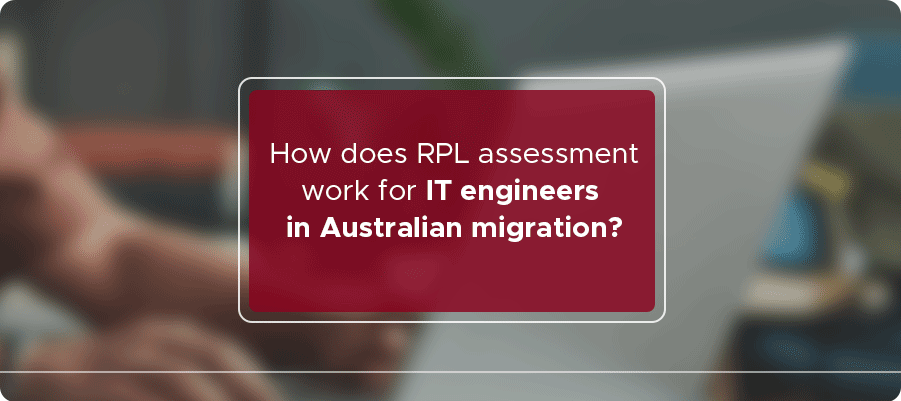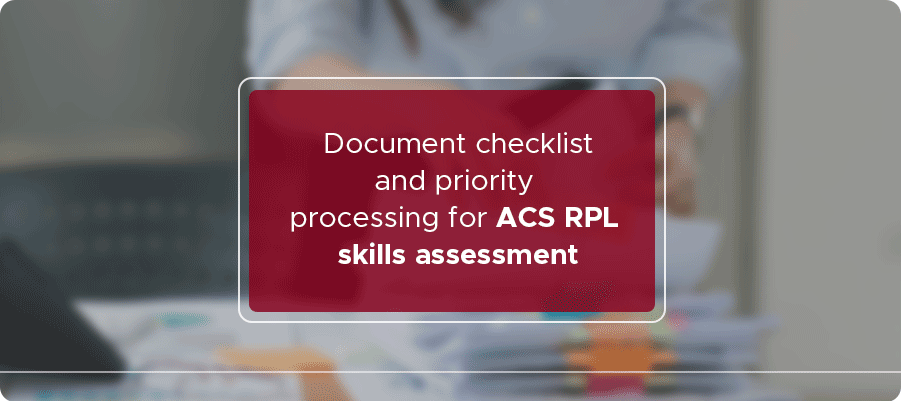
ACS RPL Skills Assessment Checklist & Priority Processing
Australia is a fantastic destination for IT professionals worldwide, with its thriving tech scene and excellent quality of life. But if you lack formal IT qualifications, there’s a crucial step to take: the ACS RPL Skills Assessment. This assessment ensures you have the skills needed for success in the Australian ICT field.
Preparing “Recognition of Prior Learning” or RPL for this assessment would be best. It is for those who need more ICT knowledge from their educational background or are switching to ICT from different professions. The Australian Computer Society (ACS) will evaluate the report to see if it’s written professionally along with the required ICT skills.
This report is essential for those who want to work in the engineering and tech industry in Australia, especially if they start with limited ICT knowledge. To get an Australian Permanent Residency (PR) in specific categories, you must check the ANZSCO skilled occupation list. This list helps you find the right job based on your knowledge and education.
You need to score at least 60 points to get that Australian PR. But the journey starts with proving your skills, which is where the ACS RPL Skills Assessment comes in. The ACS checks how good you are at the ICT job you want to do.
Visa Requirements
People need different keys (visas) based on where they’re from, the job they want, and the visa type they’re applying for. Australia has different types of visas for different purposes. For IT professionals, there are a few common visa categories:
-
Skilled Visas
These are for IT experts with skills that Australia needs. For example, there are visas like Subclass 189 (Skilled Independent), Subclass 190 (Skilled Nominated), and Subclass 491 (Skilled Work Regional). These are for people with the right IT skills and qualifications.
-
Student Visas
If you want to study IT in Australia, a student visa is what you need. Australia has excellent universities and IT courses. A student visa lets you study and can sometimes lead to other types of visas, including skilled migration visas.
-
Temporary Work Visas
If you have special IT skills or experience, you can look at temporary work visas like Subclass 482 (Temporary Skill Shortage) or Subclass 457 (Temporary Work) visas. These let you work for an Australian employer for a specific time.
-
Business Innovation and Investment Visas
If you want to start or invest in an IT-related business in Australia, these visas allow you to do that.
Learn More: Help prepare the RPL report for the ACS skills assessment.⏱⌛️
Know Your Eligibility
You must examine your job and education to know which visa is correct. The Subclass 189, 190, and 491 visas, which are famous for IT pros, need your job to match what’s on the ANZSCO skilled occupation list. This list sorts jobs based on how skilled they are.
The Subclass 189 visa, for example, needs your job to be on the Medium and Long-term Strategic Skills List (MLTSSL) or the Short-term Skilled Occupation List (STSOL). But before you can apply for these visas, you need to check if your skills, qualifications, and job experience match the standards set by the ANZSCO codes.
ACS Requirements
When you’re an IT professional looking to work in Australia, you’ll come across the Australian Computer Society (ACS). The ACS plays a significant role in checking if you have the right skills and qualifications to work in Australia. This chapter will explain what you need to know about the ACS RPL skills assessment and its requirements.
The ACS is like a big decision-maker for IT jobs in Australia. They examine your skills and qualifications to ensure you’re good enough for IT work in Australia. If you want to be a software engineer, network administrator, or anything else in IT, the ACS is the one who decides if you can do it.
Things Required for ACS RPL Skills Assessment
The ACS has a lot of rules that you need to follow. They must check your education, work experience, and more to determine your qualifications. Here are some important things they look at:
- Educational Qualifications: You need proof of your education, like degrees and certificates.
- Work Experience: The ACS checks your work history, like your jobs and what you did in them. You may need to show things like reference letters or pay stubs.
- RPL (Recognition of Prior Learning): If you don’t have formal IT qualifications, you might need to write an RPL report. This report talks about your skills, knowledge, and IT experience.
- Professional Development: The ACS wants to know if you keep learning about IT. They want you to show that you’re still getting better at your job.
- English Language Skills: Depending on where you’re from, you may need to take an English test, like IELTS, to prove you can speak and write in English.
- Fees: There are costs for the ACS process. You need to know how much money to pay for it.
The ACS looks at two types of skills assessments: the General Skills Assessment and the RPL Assessment. The first one is for people with formal IT qualifications. The second one is for people who need those qualifications. The ACS makes sure that only the best IT professionals get to work in Australia.
Existing Applicant
If you’ve already begun your ACS RPL skills assessment, this part will help you with the steps to follow as an existing applicant. It’s essential to understand how to manage your application and ensure it meets the ACS’s criteria for assessment.
Personal Documents
Gathering the correct personal documents is essential to the ACS RPL skills assessment process. You must provide a detailed checklist of personal documents like your passport, birth certificate, and more.
Learn More: Australian Visa Options for Qualified Electrical Engineers. 🧑🏽✈️🏆
Documentation Supporting a Name Change
If your name has changed because of marriage, divorce, or any other reason, knowing how to handle this in your application is essential. You need to know all documentation required to support a name change in your ACS application.
Curriculum Vitae
Your Curriculum Vitae (CV) is like your professional story. Preparing a comprehensive CV that highlights your work history, roles, responsibilities, and accomplishments is essential. Create a CV that stands out and aligns with the ACS’s requirements.
Qualification Documents for ACS RPL Skills Assessment
Now, let’s delve into the heart of the ACS RPL skills assessment: the qualification documents. You’ll need to provide evidence of your qualifications to prove your eligibility for the skills assessment. We’ll break down the types of qualification documents required and guide you on how to gather and submit them.
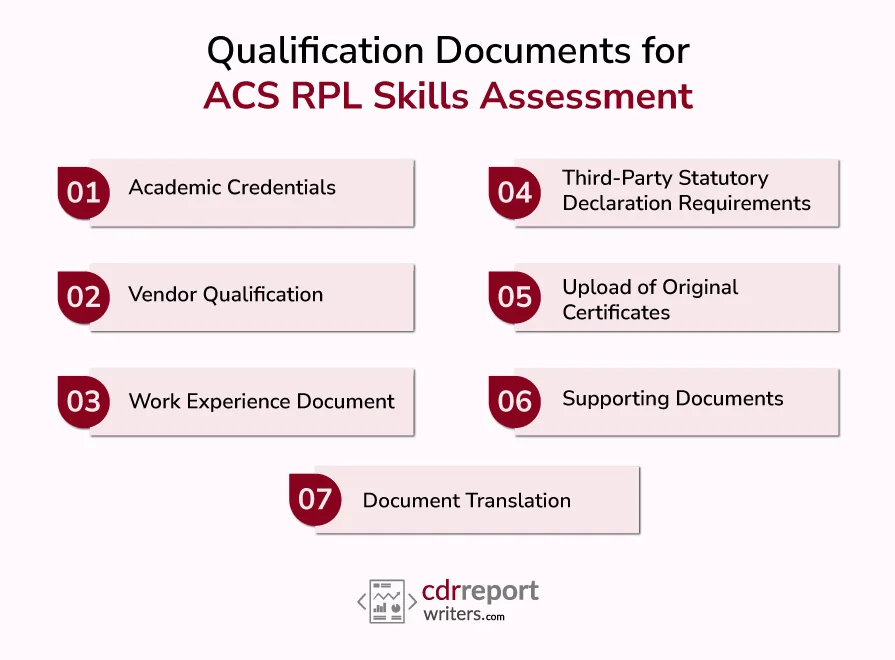
a. Academic Credentials
Your academic qualifications, like your degree certificates, diplomas, and transcripts, are essential. They show what you know and how skilled you are.
b. Vendor Qualification
It’s vital to add these needed documents to your application if you have qualifications or certifications from tech vendors. This part will assist you in getting your vendor qualifications ready and how to present them.
c. Work Experience Document
One of the critical components of your ACS RPL skills assessment is your work experience. You must provide detailed work history documentation, reference letters, and other supporting evidence.
d. Third-Party Statutory Declaration Requirements
Sometimes, you may need third-party statutory declarations to support your work experience claims. You need to know the requirements for such declarations and how to get them.
e. Upload of Original Certificates
Uploading your original certificates and documents in a suitable format is crucial. You should upload your original certificates to the ACS portal.
f. Supporting Documents
Besides your primary qualification and work experience papers, more documents can make your application even more vital.
Learn More: High-paying IT and ICT jobs in Australia: Your Gateway to Success. 🧑🏽✈️🏆
g. Document Translation
If your documents are not in English, you must provide accurate translations. You need to know the requirements for document translation and ensure that your translated documents meet the ACS’s standards.
- Document Translation Within Australia
For those who need document translation services within Australia need to find accredited translators and ensure that their documents meet the necessary standards.
- Document Translation Outside of Australia
Suppose you need document translation services outside of Australia. In that case, you need to get information on accessing accredited translators and ensure that the ACS accepts your translated documents.
How to Apply for ACS RPL Skill Assessment Priority Processing?
The validity of your skills assessment is a significant aspect of your Australian journey, influencing your career prospects and migration plans. Understanding the duration for which your skills assessment remains valid is vital for making informed decisions. In this part, we will clarify the validity of your ACS RPL skills assessment, allowing you to plan your next step.
Your ACS RPL skills assessment outcome is a valuable asset that opens doors to various opportunities in Australia. However, it’s essential to remember that this outcome has a limited validity period. The ACS specifies how long your skills assessment remains valid, and it is crucial to be aware of this timeframe as it affects your plans.
The validity period of your skills assessment starts from the date of the assessment outcome. It’s important to note that the specific assessment outcome and your circumstances can affect the duration.
The validity period of your skills assessment starts from the date you receive the assessment result. If you want to get an Australian visa for skilled migration, the Department of Home Affairs considers your skills assessment a crucial part of your application. So, ensuring your skills assessment stays valid during your visa application and beyond is very important.
To give you a general idea, a typical validity period for an ACS RPL skills assessment is two years. You have two years from your assessment outcome to apply for an Australian visa and have it linked to your skills assessment. It’s crucial to align the validity of your skills assessment with your broader migration timeline.
Learn More: ACS Processing Time for RPL Report.⌛️⏱
Renewals and Re-Application
You need to keep your skills assessment up-to-date when planning your career and moving to Australia. In this chapter, we’ll talk about how to renew for your ACS RPL skills assessment, ensuring you stay eligible.
If your skills assessment is about to expire and you still want to work in Australia, renewing it is an option. The process for renewing your skills assessment involves several key steps.
1. Assessment Review
Before you start the renewal process, reviewing your existing skills assessment is helpful. This review means returning to the criteria and requirements set by the ACS and ensuring your qualifications, work experience, and any extra documents are current and meet the current standards.
2. ACS Portal Access
Access your ACS portal or MyACS account, which you used for your initial skills assessment application. This step is where you’ll find information on your assessment and details about the renewal process. The ACS portal is a valuable resource for managing your assessment application.
3. Review ACS Guidelines:
The ACS keeps its guidelines and skill assessment requirements updated with industry standards. Before you renew your assessment, check the latest ACS guidelines to see if any changes or updates could impact your renewal.
4. Document Verification
Review your documents, like your academic credentials and work experience proof. Also, ensure they’re current and show your qualifications and experience.
5. Assessment Fee
Prepare to pay the necessary assessment fee for the renewal process. ACS fees are subject to change, so check the latest fee structure on the official ACS website.
6. Renewal Application
Start the renewal process through your ACS portal. This application may involve completing an application form designed for renewals.
7. Document Submission
Submit any updated or missing documents required for your renewal application. Ensure that all documents are well-organized and presented according to the ACS guidelines.
8. Review and Confirmation
Once you submit your renewal application, the ACS will examine your materials and confirm your eligibility. This process can take some time, so patience is crucial.
9. Outcome Notification:
The ACS will issue an outcome notification to inform you whether they have renewed your skills assessment or if you need to take further steps.
10. Validity Extension:
When your skills assessment gets renewed, the validity period usually gets extended from the date of the new outcome. This extension gives you an updated timeframe within which your skills assessment remains valid.
Renewing your skills assessment can be strategic, especially if you have faced delays or changes in your migration plans. It ensures that your skills assessment continues to be a valuable asset when applying for visas or seeking employment opportunities in Australia.
Guaranteed Positive Skills Assessment!
Get High-Quality CDR at an Affordable Price
CDRReportWriters for Your Help
In conclusion, the ACS Skill Assessment process is pivotal for ICT professionals seeking to work in Australia. Whether you pick the regular or fast-track assessment, preparing well is crucial to success in your ACS Skill Assessment journey. Understand the rules, meet the requirements, and get expert help to make your way in Australia’s ICT field.
Keep up to date by checking the ACS website and using the MyACS portal. Your ICT career in Australia is within reach, and with proper support, you can confidently achieve your goals.

